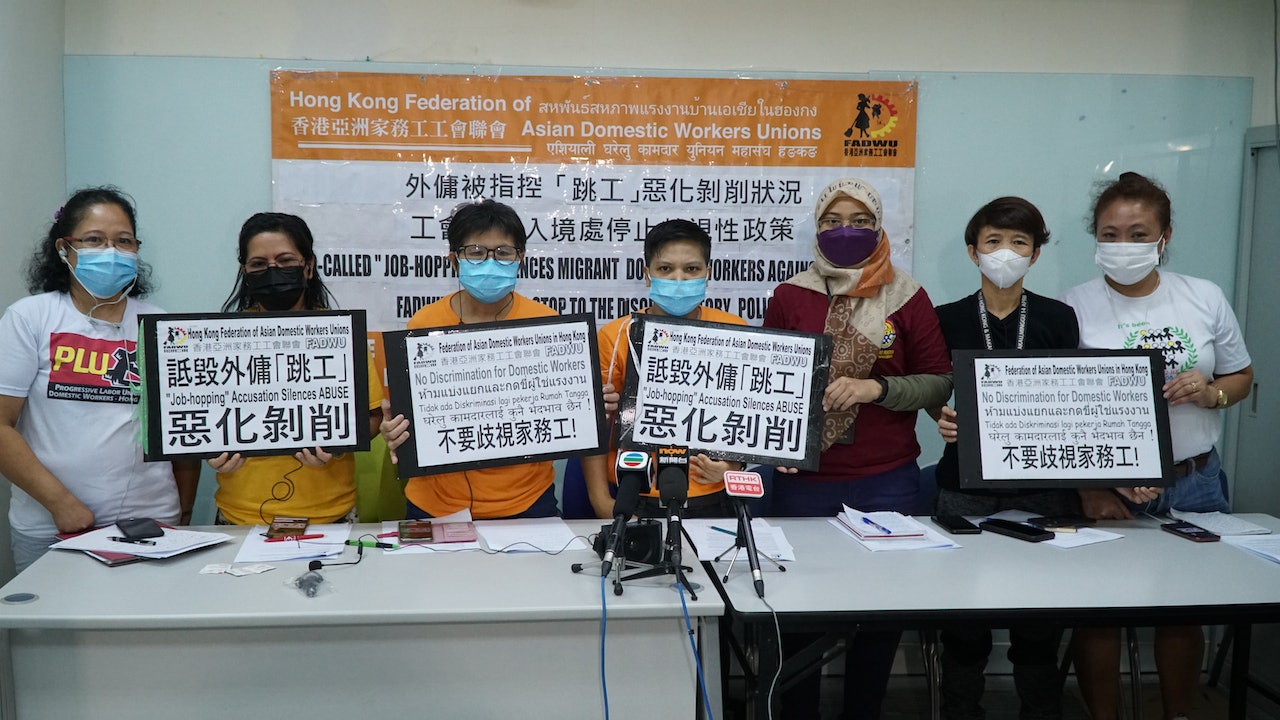In recent years, the Immigration Department has cracked down on foreign domestic helpers who “jump work”. Last year, the number of visa refusals on this ground increased eightfold year-on-year.
According to a survey conducted by the foreign domestic helper union, nearly half of the foreign domestic helpers reported that they had suffered at least one kind of mistreatment, including working for more than 17 hours, lack of suitable place to sleep and insufficient food.
62% of the respondents pointed out that they did not choose to terminate their contracts after being harshly treated, and 70% worried that the Immigration Department would refuse visas on the grounds of “jumping out of work”.
The trade union pointed out that the relevant practices of the Immigration Department were disguised as exploiting foreign domestic helpers and decided to suspend their contractual rights. Many foreign domestic helpers did not dare to propose to suspend their contracts even though they were mistreated, so they could only choose to endure them. commission rights.
From November last year to May this year, the Hong Kong Federation of Asian Domestic Workers Union successfully interviewed a total of 238 Filipino and Indonesian foreign domestic helpers by means of questionnaires.
62% of the respondents did not choose to terminate their contracts after being mistreated. As many as 70% of the respondents were worried that the Immigration Department would refuse their visas on the grounds of "jumping from work", and some respondents said that their passports were confiscated by their employers or intermediaries. And need to repay the illegal intermediary fee bound by Xing's debt.
(file picture)
FDHs who terminate their employment contracts early and switch employers are commonly referred to as "job skipping". They only have the chance to be refused a visa by the Immigration Department and need to leave Hong Kong within two weeks.
According to the data, the Immigration Department recorded 2,833 cases of refusal of visas due to suspected foreign domestic helpers skipping work last year, which is 9 times that of the previous year.
From November last year to May this year, the Hong Kong Federation of Asian Domestic Workers Union successfully interviewed a total of 238 Filipino and Indonesian foreign domestic helpers by means of questionnaires.
Respondents' work experience in Hong Kong ranged from 4 months to 34 years.
Only about 20% of them had ever terminated their contracts, and nearly half of them had suffered at least one kind of harsh treatment when working as domestic helpers, including working hours ranging from 17 to 19 hours a day, working beyond the contract, lack of food and no suitable place to sleep. rest etc.
The Hong Kong Federation of Asian Domestic Workers Union believes that when the Immigration Department strongly suppresses work skipping, it is disguised as exploiting the right of foreign domestic helpers to decide to terminate the contract.
He also pointed out that many cases still dare not propose to terminate the contract despite the harsh treatment of employers, fearing that the visa application will be rejected because of this, and urged the Immigration Department to face up to the policy of skipping work and protect the rights and interests of foreign domestic helpers.
(Photo by Zeng Fengting)
62% of the respondents did not choose to terminate the contract after being harshly treated as above, and as many as 70% of the respondents were worried that the Immigration Department would refuse visas on the grounds of "jumping from work". Forfeiture and illegal brokerage fees tied to debt repayment.
Ratih, a representative of the Hong Kong Federation of Asian Domestic Workers Union, said that the union has received a total of 11 cases of foreign domestic helpers seeking help due to "job skipping", all of them from Indonesia and the Philippines.
Ratih said that it is common for foreign domestic helpers to be unfairly treated by employers and intermediaries. However, because of their livelihood and fear of being refused visas by the Immigration Department, most of them choose to endure it.
Ratih explained that the salary of foreign domestic helpers in Hong Kong is generally only about 4,600 yuan, but most Indian and Filipino domestic helpers have to pay intermediary fees ranging from 4,000 to 5,000 yuan in installments each time they work in Hong Kong, which is much higher than the legal limit. 10% of the monthly salary, it can be seen that the related expenses are a big burden for them.
Ratih, a representative of the Hong Kong Federation of Asian Domestic Workers' Unions, said that the union has received a total of 11 cases of help for foreign domestic helpers due to "job skipping", all of which came from Indonesia and the Philippines.
At present, it is common for foreign domestic helpers to be unfairly treated by employers and intermediaries. However, because the domestic helpers make a living and are worried that they will be refused visas by the Immigration Department, most of them endure these harsh treatment.
(Photo by Zeng Fengting)
Ratih said that some domestic helpers have their passports confiscated by their employers or agents because they have not paid off the agency fees and completed contracts.
Masitah from Indonesia is one of them. She served two employers for 26 months, but both employers treated Masitah harshly.
The first employer arranged for her to sleep and rest in a small space. The workload is heavy and the working hours are high. She has to work from 5 am to late night every day. She has also tried to be beaten and scolded for failing to meet the employer's requirements.
Masitah, who does not eat pork due to religious reasons, was even asked by her employer to eat pork and various leftovers, so she had to pay extra for the food to avoid related situations.
Although Masitah tried to report it to the agency, it did not improve in the end.
Masitah later decided to "jump work", but was treated equally harshly by her second employer. She endured 8 months before deciding to terminate the contract, and then had to leave Hong Kong due to the invalidation of her visa.
Masitah, who is currently in Indonesia, still hopes to return to Hong Kong to work and earn income to support his parents. However, after inquiring with the Immigration Department, he was only told that he was not eligible for a visa.
The trade union hopes that the Immigration Department can explain the actual reasons why the foreign domestic helper does not meet the visa application requirements, and should not exploit the foreign domestic helper's right to choose to terminate the contract and switch employers through the work skipping system, so that the domestic helper who is being treated unreasonably has nowhere to escape.
After 2 months of employment, the foreign domestic helper reported to the police that there was no meal, doubtful employment, and the employer was sighed and tired. After 1 day, the result was reversed. It was difficult to find a foreign domestic helper | The situation is common, the organizers hope that the public will respect the workers: they are contributing to Hong Kong
01 Community








